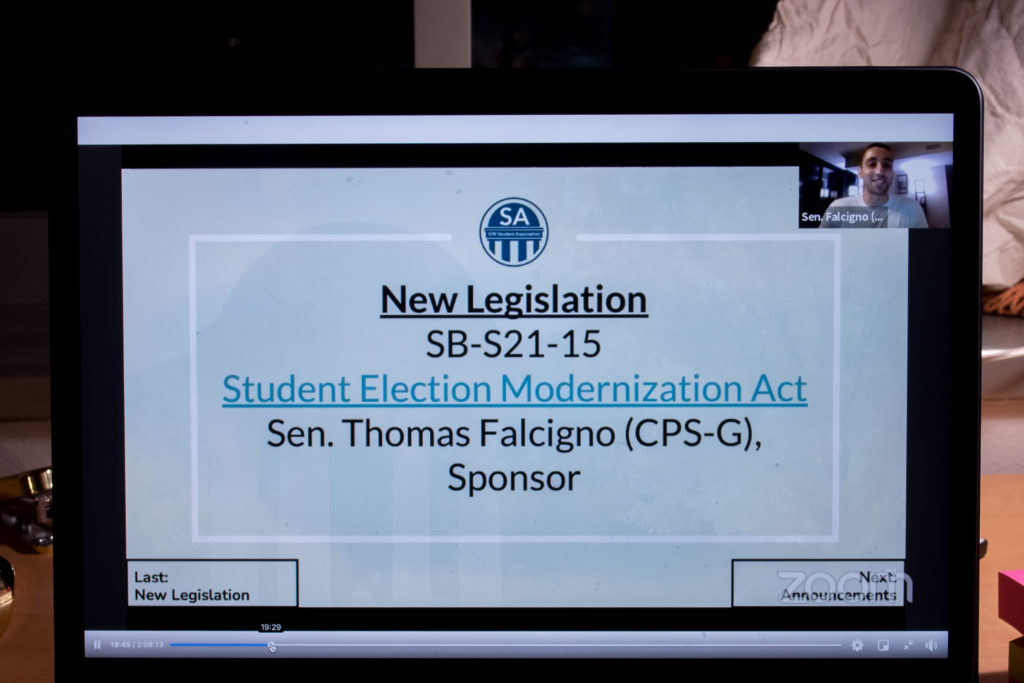The Student Association Senate unanimously approved a bill to amend election bylaws, outlining conditions for a secondary SA election following a tie between two candidates, during its final regular meeting of the year.
The bill limits the SA’s campaign period to 10 class days, allows students to write in candidates for all uncontested seats and renames a runoff election as a secondary election. SA Sen. Thomas Falcigno, CPS-G and the sponsor of the legislation, said the bill ensures that “no discrepancy” exists between election guidelines in the SA constitution, the SA’s charter and Joint Elections Commission bylaws.
“What we did do, in terms of the legislation that we proposed in the Modernization Acts, is that we really brought the student elections into the 21st century” Falcigno said.
Falcigno said the bill clarifies the preconditions for a secondary election, previously called a runoff election because guidelines previously differed between the bylaws and the constitution. He said the legislation certifies an “instant runoff election” for presidential and vice presidential races, eliminating the candidate with the fewest number of votes and sending the other candidates onto the next round until a candidate receives more than 50 percent of the vote through ranked-choice voting.
Former SA presidential candidate Hannah Edwards filed an injunction with the Student Court earlier this month disputing ranked-choice voting and requesting a runoff election between her and SA President Brandon Hill. The court dismissed Edwards’ case with prejudice, saying it demonstrated a “gross misunderstanding” of how the ranked-choice voting system works.
Falcigno said the bill will allow SA candidates to submit their registration materials, like petitions of support, online, which will help students who wish to run for office while living away from campus, especially during the COVID-19 pandemic.
The senate passed an amendment to the legislation to scale back the minimum number of signatures required to run for office. SA Sen. Chris Pino, CCAS-U, said presidential and vice presidential candidates must gather at least 1.5 percent of their constituency’s signatures, undergraduate senator candidates must collect one percent and all other candidates must compile .25 percent under the amendment.
The SA bylaws previously required 500 signatures for SA presidential and vice presidential candidates to qualify for the ballot, 100 for Columbian College of Arts and Science candidates, 75 for Elliott School of International Affairs candidates, 50 for School of Business candidates and 20 for all others. Graduate senator candidates previously needed five signatures from their constituency to run for office.
Senators unanimously passed a bill to add a referendum to the 2022 SA elections, asking students if they prefer ranked-choice voting to determine election results. SA Sen. Patrick Burland, U-at-Large and the bill’s sponsor, said the legislation would grant students a “final say” on the SA’s electoral system.
The senate unanimously passed a bill that was tabled at the last senate meeting, defining financial terms, like “line item” and “rollover funds.” The legislation devotes one percent of the SA’s general fund to initiatives benefiting students, like the CARES Fund, which helps support students in need of temporary financial relief.
Falcigno, the bill’s sponsor, said the legislation “clears up inconsistencies” in the SA’s bylaws and streamlines the allocation process that shuttles funding to student organizations.
Senators also passed the a bill approving next year’s budget allocations by unanimous consent. SA Sen. Charles Aborisade, U-at-Large and a sponsor of the bill, said the legislation lays out the SA’s financial allocations for each student organization for the upcoming academic year up until mid-October, when organizations will need to submit a second request to secure funding for the rest of the year.
“What we did in considering these requests, making sure that all the funding for these events was being concentrated within that two-month period, just so we can alleviate any uncertainty as it relates to moving into the fall,” Aborisade said.
Falcigno objected to the bill during the first round of voting because the University shifted funding costs for student organizations like club sports to the SA, raising “grave concerns” for the sustainability of the SA’s budget. He said the University should fund student organizations because allocation requests are growing while the SA’s budget isn’t.
“I’m imploring next year’s Student Association leaders to please, really look at and work with the University and see how we can devise a plan to determine what is funded by the University, what’s their responsibility and what is our responsibility when it comes to student organizations,” Falcigno said.
The senate unanimously approved a resolution that endorses GW’s recent decision to require students, faculty and staff to get fully vaccinated before returning to campus this fall. The bill also urges the University to help provide vaccines to international students and students who might struggle to secure appointments before the fall semester.
Senators also unanimously passed a bill to authorize a survey that asks international students about their experiences with remote learning during the pandemic. The survey would focus on issues like time zone differences, housing and social connections amid the online environment.
Senators confirmed Ian Lam as a Student Court judge and Trip Johnson as a JEC commissioner during the meeting. Lam and Johnson said they were “honored” to be nominated for the positions.
The senate also passed two resolutions thanking SA President Brandon Hill, Executive Vice President Catherine Morris and their teams for their work throughout the spring semester.








